Hong Kong students launch boycott over China election ruling
Hong Kong -- Hong Kong students on Monday began a week-long boycott of classes, gathering in their thousands for what democracy activists say will be a wider campaign of civil disobedience against China's refusal to grant the city unfettered democracy.
Student activists crowded onto a campus on the northern outskirts of the city, many sheltering from the hot summer sun under umbrellas and waving their faculty flags, as their leaders vowed to ratchet up their campaign if their demands were not met.
Democracy campaigners are locked in a showdown with authorities on the mainland after the former British colony's hopes for full universal suffrage were dashed by Beijing's plans to vet nominees who want to stand as its next leader.
A coalition of pro-democracy groups in the semi-autonomous Chinese city, led by Occupy Central, have labelled the restrictions a "fake democracy".
The city's vocal student community on Monday became the first wing of that coalition to move from protests to direct action -- starting a week of class boycotts designed to capture the public's imagination and bolster the pro-democracy fight.
"I don't think the Chinese government is trying to protect our rights so now we are coming out to fight for our basic needs," 20-year-old architecture student Wu Tsz-wing told AFP as she gathered with what organisers said were 13,000 others on the leafy campus of the Chinese University of Hong Kong.
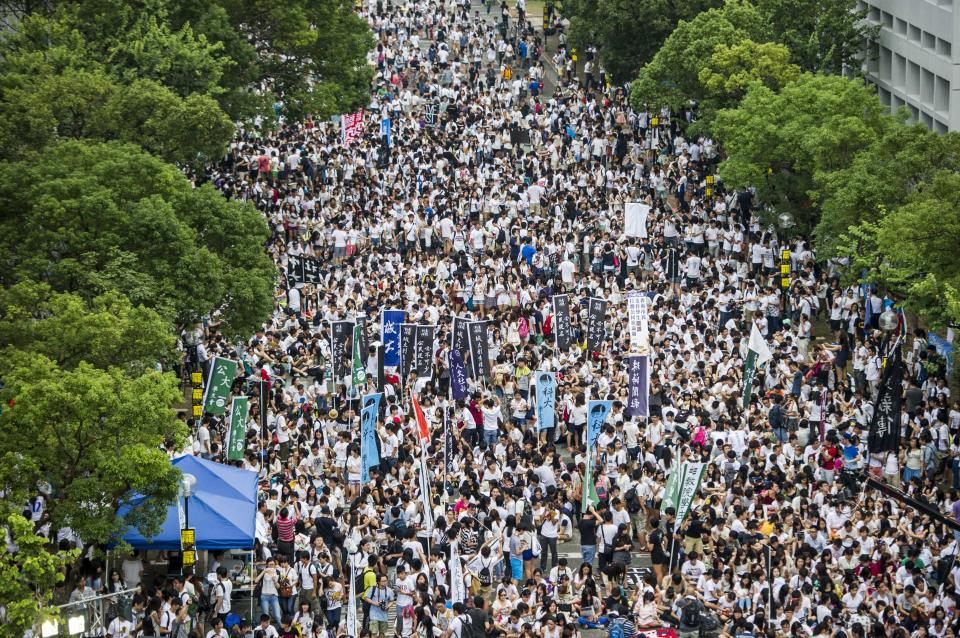
Students gather during a strike at the Chinese University of Hong Kong on September 22, 2014
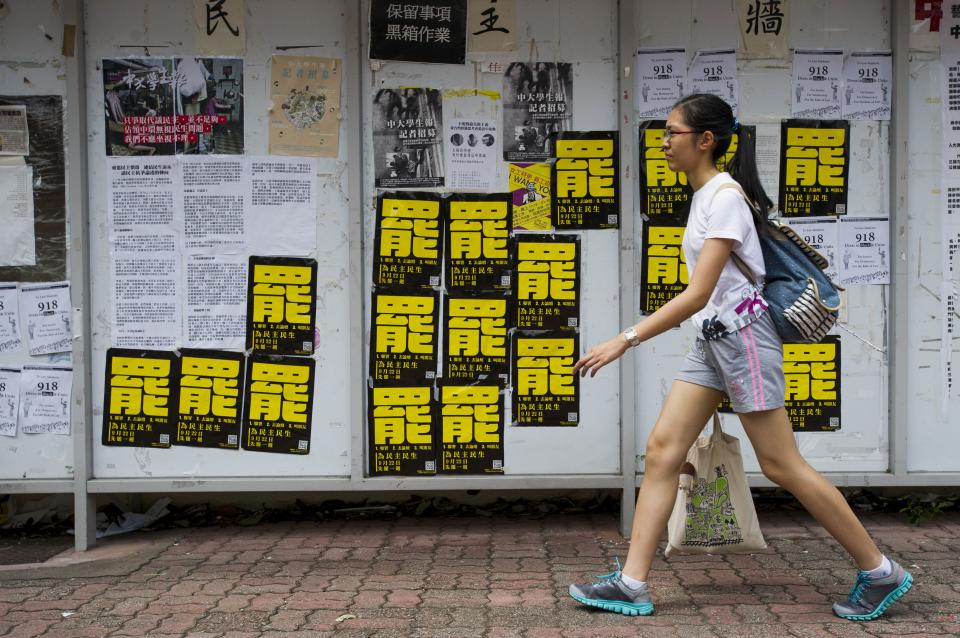
A student walks past posters (black and yellow) calling for strikes at the Chinese University of Hong Kong on September 22, 2014
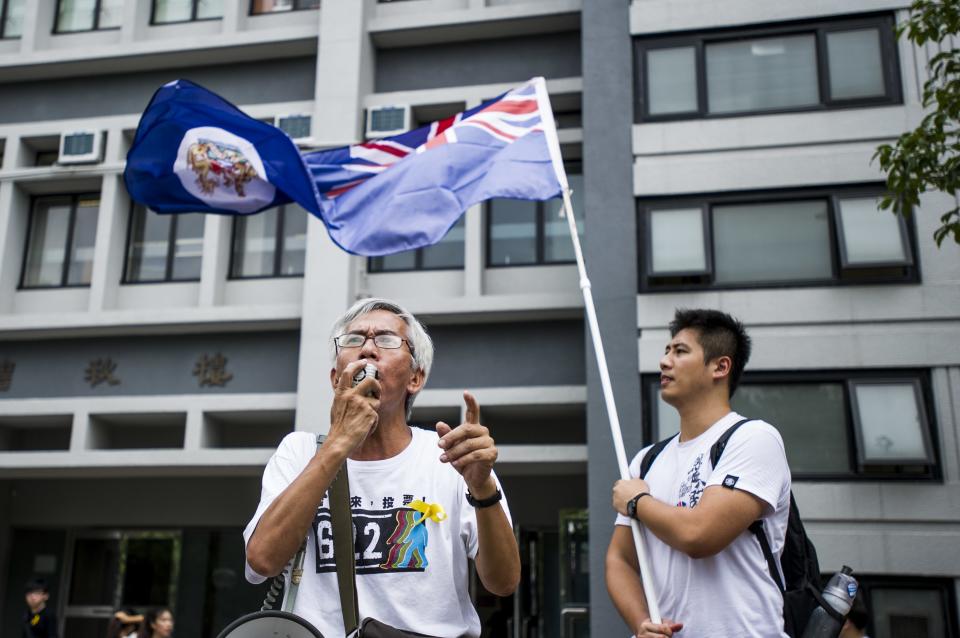
An activist calls for a strike at the Chinese University of Hong Kong on September 22, 2014
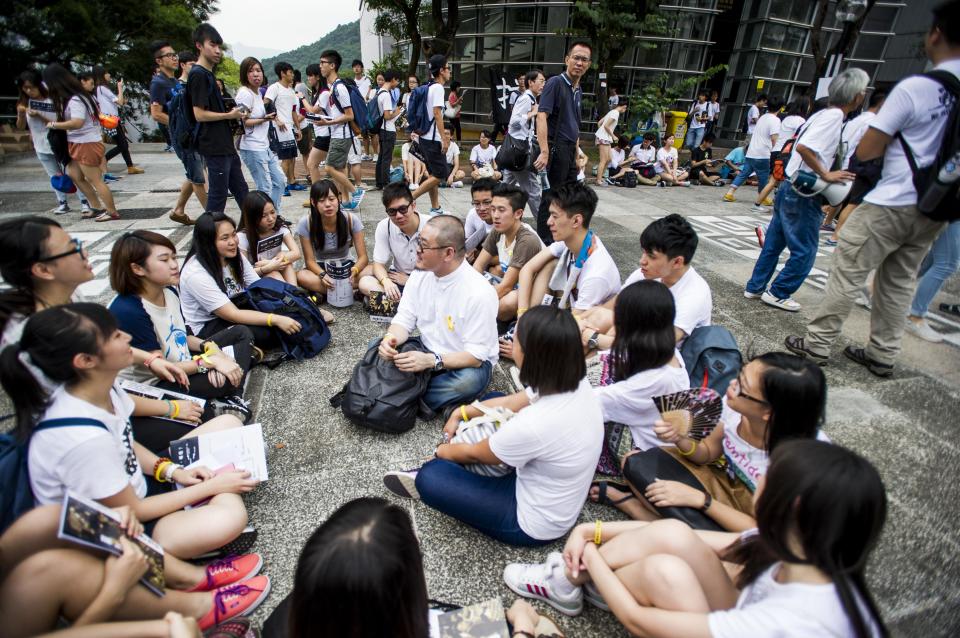
Students gather at the Chinese University of Hong Kong campus on September 22, 2014, as they begin a week of class boycotts

Students stage a rally at the Chinese University of Hong Kong campus in Hong Kong, Monday, Sept. 22, 2014. Thousands of Hong Kong students boycotted classes Monday to protest Beijingâs decision to restrict electoral reforms in a weeklong strike marking the latest phase in the battle for democracy in the southern Chinese city
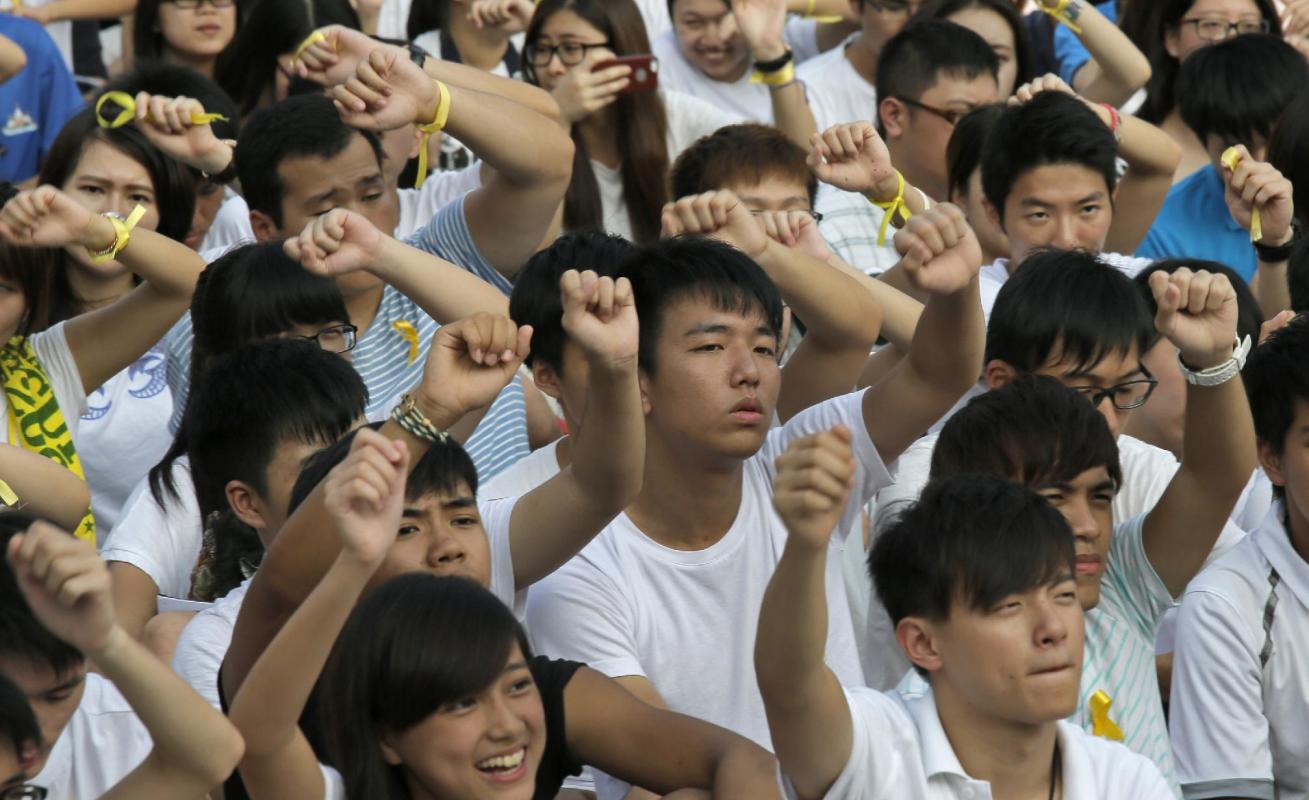
Students wave their fists during a rally at the Chinese University of Hong Kong campus in Hong Kong, Monday, Sept. 22, 2014.
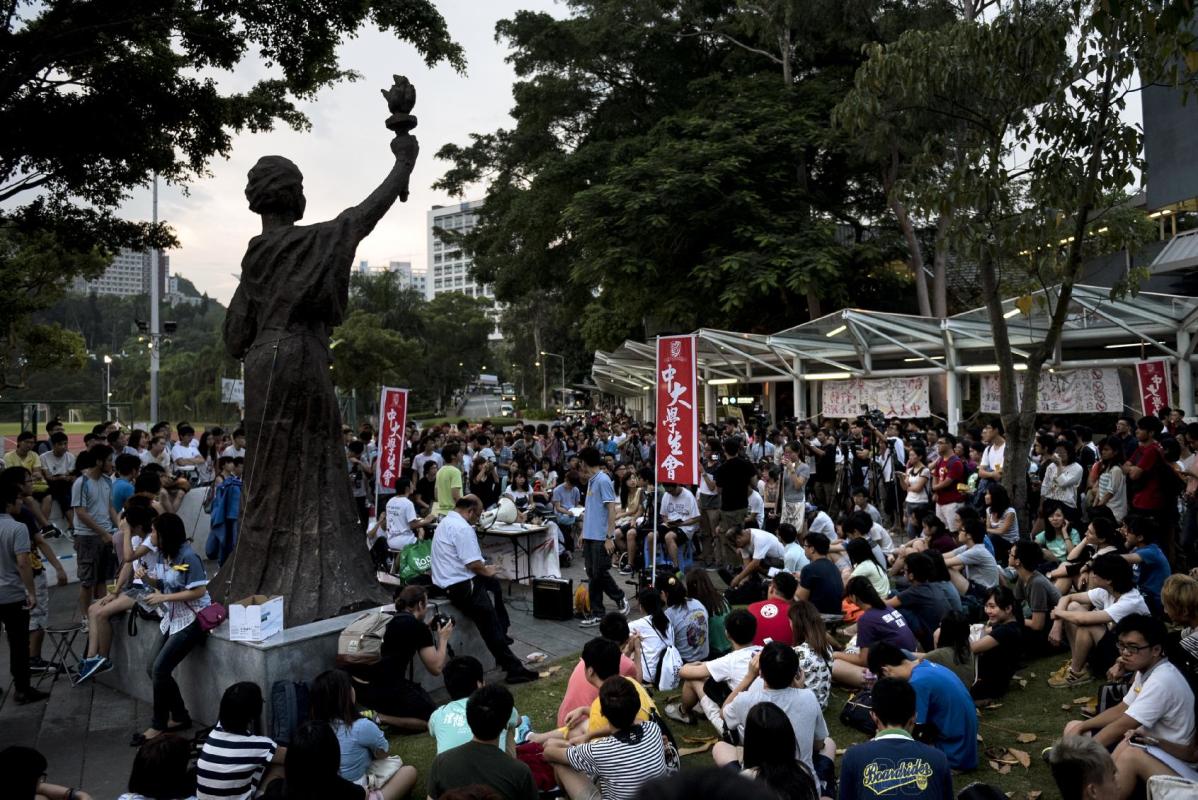
Students at the Chinese University of Hong Kong meet next to a replica of the "Goddess of Democracy" statue to discuss a possible student strike in Hong Kong on September 4, 2014
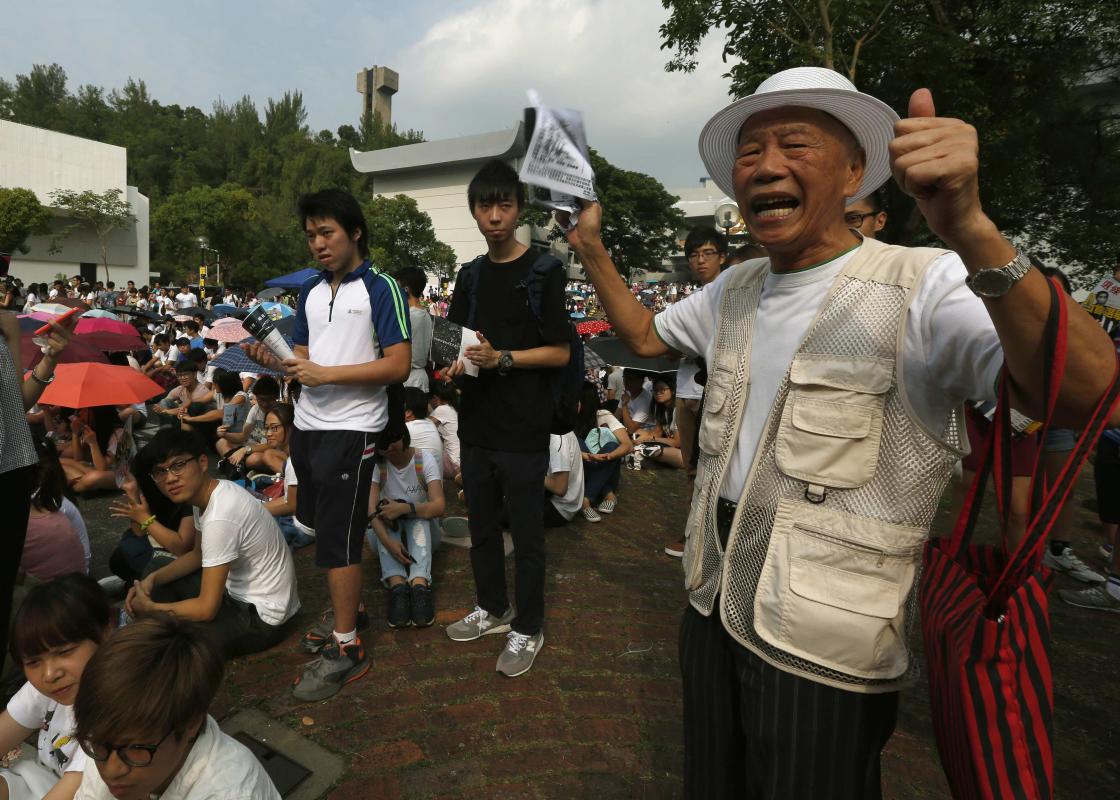
A supporter reacts as students from various universities take part in a demonstration at the Chinese University in Hong Kong September 22, 2014. Thousands of students braved sweltering heat in Hong Kong on Monday to demand greater democracy as they launched a week-long boycott of classes, underscoring a restive younger generation's determination to challenge the Chinese Communist Party.
Protests to intensify
There was no estimate given by police, who usually quote much lower numbers during similar protests.
Arika Ho, a second-year Hong Kong University journalism student, added: "I want this place (Hong Kong) to be a better place, so I want to stand up and join with others collectively to force some changes."
Alex Chow, chairman of the influential Hong Kong Federation of Students, said student groups would intensify their protests if their call for Hong Kongers to nominate their own candidate to lead the city is ignored.
"We demand the government to respond to our call to endorse civil nominations," he told the crowd.
"If we hear nothing from them, the students, the people will definitely upgrade the movement to another level," Chow shouted.
The Chinese University of Hong Kong has become a regular gathering point for students agitating for greater democratic freedoms in the city.
The campus boasts a replica of the "Goddess of Democracy" statue which students gathered around during the 1989 Tiananmen protests in Beijing that were brutally crushed by the state.
The Hong Kong strike could breathe new life into the democracy campaign, which recently lost some steam after its senior leaders conceded that Beijing is highly unlikely to change its mind whatever they do.
Leaders from Occupy on Monday said they were encouraged by the student turnout.
"The future belongs to them (the students)," co-founder Benny Tai told AFP.
Some considering emigration
"I think that if they can stand up and demonstrate determination in wanting democracy in Hong Kong, I think that will be a clear message to Beijing and the government."
But in Beijing, the rhetoric in official media has remained unrelenting against any concessions to the Hong Kong democracy movement, which some in the Communist regime see as an insidious threat to their rule of the country as a whole.
"The basic policy of the Chinese government on Hong Kong hasn't changed and will not change," Chinese president Xi Jinping told Hong Kong business delegates, including Asia's richest man Li Ka-shing, on a visit to Beijing Monday.
But he added that the "one country, two systems" deal, which guarantees greater freedoms for Hong Kong than seen on the mainland, was not under threat as it meets "the interest of the country and Hong Kong, and also the interest of foreign investors".
Tensions in the southern Chinese city are at their highest in years over rising inequality and Beijing's perceived political interference.
More than one in five Hong Kongers are considering emigrating because of the political climate, according to a poll by the Chinese University of Hong Kong released Sunday.
The poll also revealed widespread pessimism over the city's political future. On a scale of zero to 10, with zero being "extremely pessimistic", the average response was 4.22.

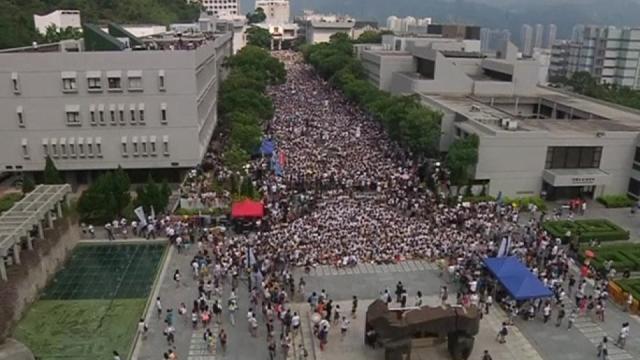
No comments:
Post a Comment